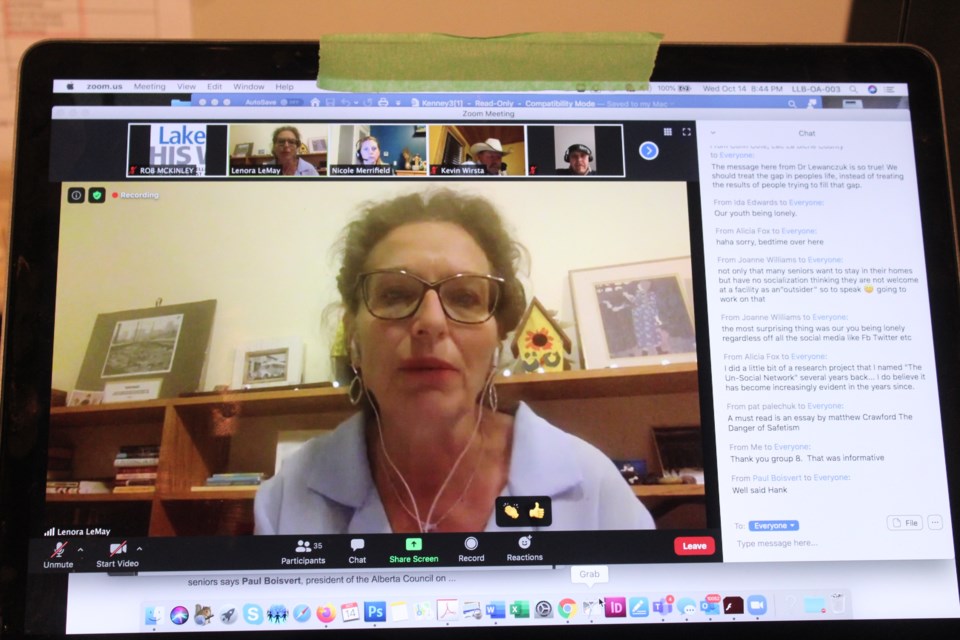LAKELAND - The irony of giving a presentation on the topic of loneliness to 40 virtual faces on individual computer screens because a pandemic has isolated the population, was not lost on Dr. Richard Lewanczuk.
A feature presenter at last Wednesday night's Lakeland Communities Health Advisory Council's (HAC) Zoom meeting, the Edmonton-based endocrinologist and medical director of Chronic Disease Management at the University of Alberta Hospital says human contact, touch and conversation has a lot to do with positive healthcare. During the current coronavirus global pandemic, that contact has been strained, he said, and has had an adverse affect on many area residents.
"Covid-19 has really been a stress test for the healthcare system ... We hear that 'we are all in this together' — and I say, nonsense. We are told to stay in our houses and to social distance," said Lewanczuk to a virtual group of 40 representatives of Lakeland communities. "It's no different than being in a jail in solitary confinement."
Study after study, the doctor said, shows the ill effects of isolation and loneliness in all aspects of health — especially for seniors.
"Loneliness is the single greatest predictor of hospitalization and healthcare costs overall in seniors," he said, hoping to draw attention to the effects of loneliness in the community. "In the medical care system, we now understand that heart disease, cancer, diabetes, a lot of our common, chronic diseases are related to low levels of inflammation — and loneliness stimulates this low level of inflammation."
With representatives from Lac La Biche, Bonnyville, Cold Lake, St. Paul, the Redwater area, and the Athabasca region, the zoom meeting was held in conjunction with Alberta Health Services and the Lakeland Communities Health Advisory Council to discuss how communities can support health and wellness, during the COVID pandemic, and after.
Lewanczuk said attention to the overall impacts of loneliness must be highlighted — especially when there are challenges with social interaction.
"Simply sitting with someone ... laughing with someone ... sharing a meal, going for a walk with someone — these things cost nothing, and yet they have the greatest impact on the single greatest determiner of our healthcare costs," he said — pointing out that even though the COVID-19 pandemic has made many parts of human contact impossible, some actions can still be taken. Doing something — even one thing — just identifying someone who may be struggling with loneliness, is a big step forward, he stressed. Creating awareness to the issue is vital, Lewanczuk continued, explaining that children, teens, young adults and seniors can all be affected by loneliness. And community members in those same groups can help those struggling with loneliness. Neighbours can simply ask each other how they are doing, or take the time to listen to each other. Family members can reach out to relatives with a phone call, and community leaders can help create programs and awareness for residents to take part in.
"Happiness requires just three things; something to do, someone to love and something to look forward to," he said, telling the Zoom meeting's participants that they hold the key to improving overall social well-being.
"A healthcare system is nothing more than people looking after people. That's you, that's me — and what we can do to look after each other," he said.
See: Dr. Richard Lewanczuk on the Importance of Happiness
Around the region, several examples of community supports were identified. Cold Lake Mayor Craig Copeland said his community had gone to great lengths to create programs and activities to facilitate activity. With almost a quarter of the city's population aged 14 and under, Copeland said there has been a strong focus on youth activities and programming, even offering free transit transportation to facilities.
Lac La Biche County Mayor Omer Moghrabi credited his community's support services for programming that has been well-received throughout the COVID pandemic. He said the municipality's Family and Community Support Services department has created programs and workshops that have attracted children, teens, adults and seniors. He also said the development of recreation facilities in the community gives residents choices and options.
Connecting locally
Lac La Biche psychologist Lenora Lemay, Ph.D., was one of the meeting's participants and presented details on a new, local committee she has spearheaded. Still in its early stages the Lac La Biche Community Connections Committee has a goal of reducing the effects of loneliness by linking community members to service clubs, volunteer opportunities and other like-minded residents.
"We want to enable people to have a sense of purpose and belonging," said Lemay, explaining that the committee is inter-generational and interdenominational with hopes of taking on members from all walks of life. "We want to increase the opportunity for individuals to connect with each other."
The committee has only met three times in the last year, with the COVID pandemic forcing a hiatus after their third meeting in March.
Lemay plans to re-ignite the group, saying the recent health advisory council meeting has shown that more needs to be done to bring awareness and understanding when it comes to the issue of loneliness.
"I feel the call back to the table after last night," she said the day after the Zoom meeting.
The topic of loneliness is a global theme. In 2018, the British Parliament created a government portfolio — the ministry of Sport, Civil Society and Loneliness. The ministry is said to offer programming for the 15 percent of Brittains who reported feeling lonely some or all of the time. A similar report tabled in the United States showed that half of the surveyed 20,000 Americans suffer from feelings of loneliness.


